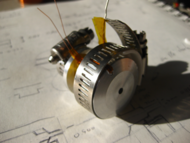Bottlebot
Release status: Experimental
| Description | This is a prototype system for simply an effectively processing individual HDPE plastic bottles into filament for FDM 3D printers.
|
| License | GPL
|
| Author | |
| Contributors | |
| Based-on | |
| Categories | |
| CAD Models | |
| External Link |
Background and Concept
Recycling plastics into the raw materials for 3D printing is an idea that has been around for several years. A number of people have worked on the problem with varied degrees of success.
- The web4deb extruder reliably extrudes HDPE filament to be used as a growth medium in hydroponics applications. It is a granule-base extruder with an auger mass-transport system that can readily turn virgin HDPE granules or carefully cut-up HDPE bottles into extrudate.
- The RecycleBot project implemented the web4deb extruder and began to explore methods of processing plastics to a form suitable for the auger mass-transport system. The project's reprap wiki has more condensed information.
- A group of students at Delft University researched methods of extruding filament from recycled plastic and put together a report documenting their attempts and prototypes. They used blenders and paper shredders to process bottles into an acceptable granular form for their extruder.
All of these projects have demonstrated that it's possible to extrude recycled plastic. But that's a solved problem. Extruding filament is not challenging part of task. Processing the source of recycled plastic material is. I think the value of these projects is that they have demonstrated that blenders, paper shredders, and studious hours with a pair of scissors are not feasible methods of materials processing. This materials processing wall is what's been holding back progress on this problem.
I am developing a system to solve this problem as my engineering senior design project at Swarthmore college. I am approaching the materials processing problem by first narrowing the scope of the problem to recyclable items that have a high material yield. I am targeting plastic bottles over plastic bags and other plastic because they have a large mass of material per individual item and are easily found all over the planet.
Second, I am not pursuing the shredding and grinding methods that have been demonstrated as insufficient for this application. Industrial plastics recycling technology relies on industrial-scale shredders, like this one, to process recyclables into a suitable feedstock for further refining processes. However, this is not a process that scales down very well (at least cost-effectively). I am instead attempting to "unwind" HDPE bottles into a long, rectangular cross-section filament that is fed into a middleman extruder to produce 3mm or 1.75mm filament for use in established open source fused filament fabrication (FDM) 3D printers.
Though admittedly less versatile in material inputs when compared to industrial recycling operations, I think that this approach may be effective on a maker-scale (a scale for which it often doesn't make sense to compare to industrial-scale operations). I am initially pursuing HDPE as my material of interest because it has been demonstrated here and here as a viable FDM printing material and is plentiful. I will investigate further common thermoplastics after roughing out the system with HDPE feed.
Status
This project was completed by Andreas Bastian in May of 2012. Documentation is being recompiled for this wiki and will be available soon. Meanwhile, please see this overview of the project or the project final report for more information. Updates on the project from the Spring of 2012 can found here. Questions can be directed to andy (at) andreasbastian (dot) com.
